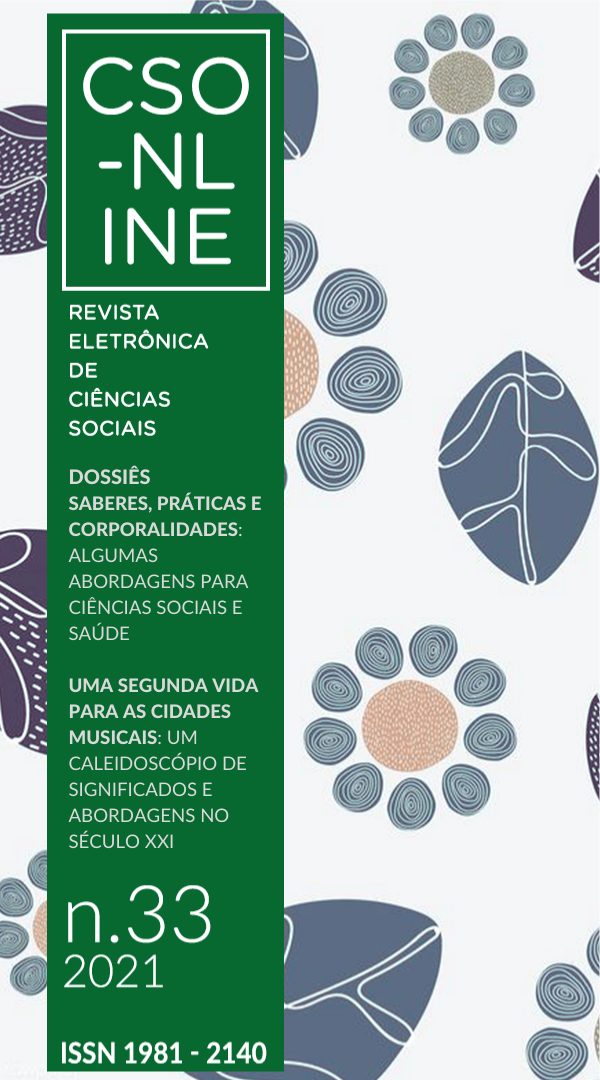Apresentação - Uma segunda vida para as cidades musicais. Um caleidoscópio de significados e abordagens no século XXI
DOI:
https://doi.org/10.34019/1981-2140.2021.35782Keywords:
Music Cities, Music Scenes, Cultural PoliciesAbstract
The hustle and bustle of everyday life makes sounds overlooked. They make us like music, but we can hardly identify one as a favorite. As Carlos Ruiz Zafón wrote about books, we can see that in each song there is a song within the song itself. In his work ‘A Sombra do Vento’ [The Shadow of The Wind] (2021), Zafón reflected on the amount of ordinary things that get lost or are forgotten, hence he imagined the creation of a special library to keep the forgotten books of the city, but captive in the soul of those who read them. The same analogy can be made for this Dossier, about the second life of musical cities, in the sense that we see the city in the role of this special library, which keeps the songs that have touched the souls of others. Music and sound are ubiquitous. Whether it is in the performance of a street artist, at a concert, on the rails of a train, in the industrial machines that create symphonies of urban development, in the chords of the slow footsteps on the pavements, in the parting words of another day and the waking of a dawn (Guerra, 2020a; 2020b). All this is life. A second life that is neither seen nor recognised. In fact, Paulo Cunha e Silva already said that the future is now (Silva, 2018). It is thus determining to think about the ways in which music marks the urban in the short, medium and long term. In fact, it is enough to have as an example of this statement the fact that only in 2015 the city of Liverpool was recognized as a ‘City of Music’ by UNESCO, much due to its connection with The Beatles (Aughton, 1993). Or we can also refer to cities like New Orleans in the United States or Rio de Janeiro in Brazil as examples of contemporary music cities, because each one of them is associated with a musical style, an artist, a concert or even experiential experiences that are created around that idea.
Downloads
References
Aughton, P. (1993). Liverpool: A people’s history. Preston: Carnegie Publishing.
Bennett, A. & Peterson, R. (Eds.) (2004). Music scenes: Local, translocal, and virtual. UK: Vanderbilt University Press.
Fernandes, C. S.; Herschmann, M. (2018). Cidades musicais. Comunicação, territorialidade e política. Porto Alegre: Editora Sulina.
Flew, T. (2008). Music, cities, and cultural and creative industries policy. In Peters, M.; Luckman, S. & Bloustein, G. (Eds.). Sonic synergies: Music, technology, community, identity (pp.7-16). UK: Ashgate Publishing Limited.
Guerra, P. (2020a). Paixões sónicas conservadas em disposofonias: o musicar de Gustavo Costa e da Sonoscopia. ArtCultura Uberlândia. 22, 41, 7-29.
Guerra, P. (2020b). Dystopian mermaids: an essay on the relevance of dystopia in contemporary Portuguese artistic creations. Arte e Ensaios, Rio de Janeiro, PPGAV-UFRF. 26, 40, 393-407.
Guerra, P. (2020c). Um lugar sem lugar… No rock português. Outros Tempos – Pesquisa em Foco, Dossiê Feminilidades e masculinidades em foco, 2, 25, 181-204.
Guerra, P. (2018). Raw Power: Punk, DIY and underground cultures as spaces of resistance in contemporary Portugal. Cultural Sociology, 12, 2, 241-259.
Guerra, P. (2010). A instável leveza do rock: génese, dinâmica e consolidação do rock alternativo em Portugal. Tese de Doutoramento. Porto: Faculdade de Letras da Universidade do Porto.
Landry, C. (2000). The creative city: A toolkit for urban innovators. London: Earthscan.
Nora, P. (1984). Les lieux de mémoire. Paris: Editions Gallimard.
Regev, M. (2013). Pop-rock music: Aesthetic cosmopolitanism in late modernity. Cambridge: Polity Press.
Silva, H. T. da (2018). 751 dias – O tempo não consome a eternidade. Porto: Edições Município do Porto.
Zafon, C.R. (2021). A sombra do vento. Lisboa: Editorial Planeta.
Downloads
Published
How to Cite
Issue
Section
License
Copyright (c) 2021 CSOnline - REVISTA ELETRÔNICA DE CIÊNCIAS SOCIAIS

This work is licensed under a Creative Commons Attribution 4.0 International License.
Todos os artigos científicos publicados na CSOnline – Revista Eletrônica de Ciências Sociais estão licenciados sob uma Licença Creative Commons







